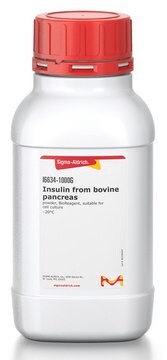D4902
Dexamethasone
powder, BioReagent, suitable for cell culture, ≥97%
Synonym(s):
(11β,16α)-9-Fluoro-11,17,21-trihydroxy-16-methylpregna-1,4-diene-3,20-dione, 9α-Fluoro-16α-methyl-11β,17α,21-trihydroxy-1,4-pregnadiene-3,20-dione, 9α-Fluoro-16α-methylprednisolone, Prednisolone F
About This Item
Recommended Products
biological source
synthetic
Quality Level
product line
BioReagent
assay
≥97%
form
powder
potency
4-500 ng/mL
technique(s)
cell culture | mammalian: suitable
single cell analysis: suitable
mp
262-264 °C (lit.)
solubility
methanol: 25 mg/mL
shipped in
ambient
storage temp.
2-8°C
SMILES string
C[C@@H]1C[C@H]2[C@@H]3CCC4=CC(=O)C=C[C@]4(C)[C@@]3(F)[C@@H](O)C[C@]2(C)[C@@]1(O)C(=O)CO
InChI
1S/C22H29FO5/c1-12-8-16-15-5-4-13-9-14(25)6-7-19(13,2)21(15,23)17(26)10-20(16,3)22(12,28)18(27)11-24/h6-7,9,12,15-17,24,26,28H,4-5,8,10-11H2,1-3H3/t12-,15+,16+,17+,19+,20+,21+,22+/m1/s1
InChI key
UREBDLICKHMUKA-CXSFZGCWSA-N
Gene Information
human ... ABCB1(5243) , CYP3A4(1576) , IL4(3565) , IL5(3567) , NR3C1(2908)
mouse ... Abcb1a(18671) , Abcb1b(18669) , Ifng(15978) , Nos2(18126) , Ptgs2(19225) , Tnf(21926)
rat ... Ar(24208) , Nr3c1(24413) , Tnf(24835)
Looking for similar products? Visit Product Comparison Guide
Application
Biochem/physiol Actions
Packaging
Physical form
Reconstitution
Related product
signalword
Danger
hcodes
Hazard Classifications
Repr. 1B
Storage Class
6.1C - Combustible acute toxic Cat.3 / toxic compounds or compounds which causing chronic effects
wgk_germany
WGK 3
flash_point_f
Not applicable
flash_point_c
Not applicable
ppe
dust mask type N95 (US), Eyeshields, Faceshields, Gloves
Certificates of Analysis (COA)
Search for Certificates of Analysis (COA) by entering the products Lot/Batch Number. Lot and Batch Numbers can be found on a product’s label following the words ‘Lot’ or ‘Batch’.
Already Own This Product?
Find documentation for the products that you have recently purchased in the Document Library.
Customers Also Viewed
Articles
Oxidative stress is mediated, in part, by reactive oxygen species produced by multiple cellular processes and controlled by cellular antioxidant mechanisms such as enzymatic scavengers or antioxidant modulators. Free radicals, such as reactive oxygen species, cause cellular damage via cellular.
Protocols
Stem cell reprogramming protocols to generate human induced pluripotent stem cells (iPSCs) including viral and non-viral RNA based methods.
Our team of scientists has experience in all areas of research including Life Science, Material Science, Chemical Synthesis, Chromatography, Analytical and many others.
Contact Technical Service










